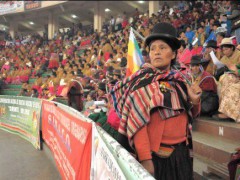My daughter won´t be your maid

Felipe Quispe, a prominent indigenous leader who sieged the city of La Paz in 2000 in order to induce the structural change our country needed so much was a student at the San Andrés University in La Paz. He was a History student and got some of his protest ideas from the indigenous rebellion of 1781 leaded by Túpac Katari.
A couple of years later, after the political storm he was involved in was through he went back to classes to finish his degree and to write his thesis. One morning he and some teachers met at the University gates. They all engaged in a conversation on what had happened and asked Felipe many questions about his motivations to lead such massive protests that were so powerful but ultimately seemed (back then) to have failed in their main goals, asked him: Felipe, why are you doing this? Why did you go so far?
His political motivations were clear to all, it was the personal that caused curiosity amongst his teachers, and he said: Because I don´t want my daughter to be your maid.
Gender inequality in Bolivia is a reality hard to confront and change because there are so many aspects that need our constant work and support, starting with our basic rights, health, water, education, poverty, etc. However, it was and still is inspiring, to listen and have met this indigenous leader that sieged the city (seat of the government) to give his daughter a chance, to give her a new, different country. It may be my romantic angle to what happened, but it´s the one that keeps me moving and the one I want to share and remember for men and women all over the world. Not being actively involved in a feminist organization doesn´t mean men and women are fighting to make things better and to empower women.

Niñas indígenas del Territorio Indígena y Parque Nacional Isiboro Sécure - TIPNIS -Asociación de Scouts de Bolivia
Felipe Quispe, es un prominente líder indígena que cerco la ciudad de La Paz el año 2000 para inducir al cambio estructural que nuestro país tanto necesita. Él fue estudiante de la Universidad Mayor de San Andrés, de la Carrera de Historia donde aprendió sobre la rebelión de 1781 de Túpac Katari y de donde sacó la inspiración para el cerco que hizo a la ciudad.
Después de un par de años, cuando la tormenta política había pasado Felipe volvió a clases para terminar su tesis. Una mañana él y un grupo de profesores se encontraron en la puerta de la Universidad y le preguntaron acerca de sus motivaciones y sobre lo que había pasado. En ese momento parecía que tanto conflicto no había llevado a nada a pesar de haber sido tan poderoso. Entonces le preguntaron: Felipe, por qué has hecho el cerco? Por qué has ido tan lejos?
Sus motivaciones políticas eran evidentes para todos los bolivianos entonces, sin embargo no se conocían las personales. Felipe contestó: Porque no quiero que mi hija sea tu empleada.
La desigualdad de género en Bolivia es una realidad dura, difícil de confrontar y cambiar porque hay tantos cambios que hacer en la base, cambios que necesitan nuestro trabajo y apoyo constantes como la lucha por nuestros derechos básicos, salud, acceso al agua, educación, etc. Sin embargo, fue y sigue siendo inspirador haber escuchado y conocido a este líder indígena que sitió la sede de gobierno para darle a su hija una oportunidad, un nuevo país, uno diferente. Puede que sea mi romántica mirada al asunto, sin embargo me sigue moviendo y es la historia que quiero compartir y recordar con los hombres y mujeres del mundo. Porque no estar involucrado en movimientos feministas o de género, no significa que no se esté trabajando por y para otorgarle un mejor lugar a la mujer.
Tags: discriminiation, equality, gender, inequality, International Women's Day, women

